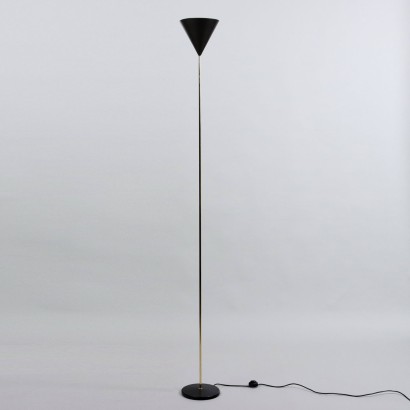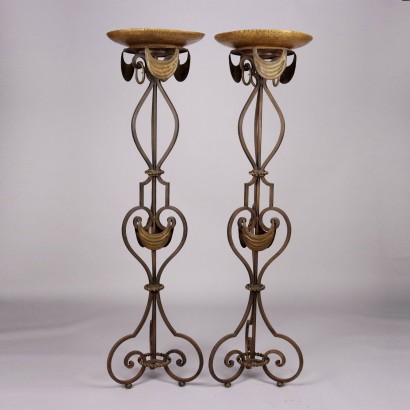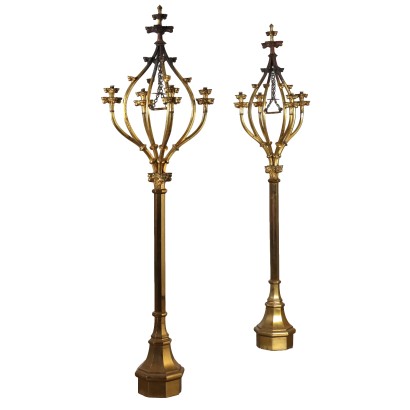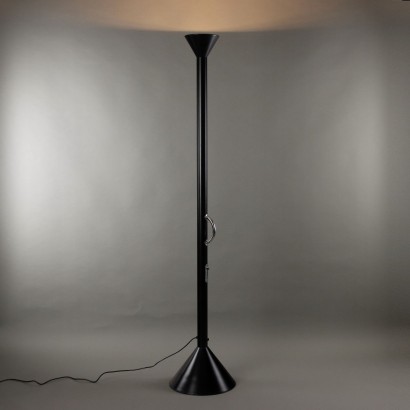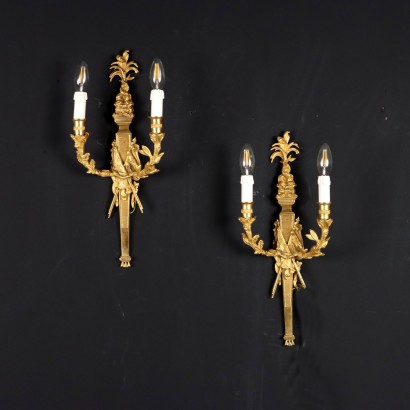Vintage Lamp Azucena LTE5 Alluminium Italy 1970s
Features
Designer: Luigi Caccia Dominioni
Production: Azucena
Time: 1970s
Production country: Milano, Italy
Material: Lacquered Aluminum , Cast Iron , Brass
Description
Elegant floor lamp designed by Luigi Caccia Dominioni in 1954 with painted cast iron base, brass stem and lacquered aluminum lampshade. Good conditions
Product Condition:
Product in good condition, has small signs of wear. We try to present the real state as fully as possible with photos. If some details are not clear from the photos, what is stated in the description applies.
Dimensions (cm):
Height: 191,5
Diameter: 20
Additional Information
Designer: Luigi Caccia Dominioni
Luigi Caccia Dominioni was born in Milan in 1913. He completed the entire cycle of studies, up to the Liceo Classico, at the Istituto Leone XIII in Milan, run by the Jesuits. In 1931 he enrolled in the Faculty of Architecture at the Milan Polytechnic. He graduated in 1936 and obtained the professional qualification in Venice. In 1936, with the brothers Livio and Piergiacomo Castiglioni, he opened a professional studio. He did his military service from 1939 to 1943, but refused to join the Social Republic of Salò and had to go to Switzerland. From 1945 he resumed his activity as an architect, first with his colleague Castiglioni, then, from 1946, with his own professional studio. In 1947 he dedicated himself to the production (Azucena) of furniture and design objects with the architect Ignazio Gardella. He mainly works on buildings in Milan and its province. He moved to the Principality of Monaco in 1975, where he built the Parc Saint Roman skyscraper.Find out more about Luigi Caccia Dominioni with our insights:
FineArt: Lamp 'LTE10'
Production: Azucena
That of the Azucena is a story born from the dialogue between producer, architect, artisans and customers. It all began in 1947, when a group of young Milanese - Luigi Caccia Dominioni, Corrado Corradi Dell'Acqua, Ignazio Gardella, Maria Teresa and Franca Tosi - decided to start the production of furniture designed by some of them in order to have a repertoire of ready-made furnishings, from sofas to handles, from tables to doorstops, for the homes they are planning. They are experimental furniture and objects that modify custom, contemplating the use without preconceptions of new materials, often combined with traditional ones in a completely surprising way. Even the realization is laborious and complex because their components are many and can come indifferently from industry or crafts. The lacquer, the polished chromed brass, the crystal reveal a constant search for luminosity, brilliance, transparencies, in materials as well as in finishes and colors, to escape from a conventional severe opacity. The furnishings are often called prosaically (Funnel, Boccia, Chrome bands, Ventola, Toro) to indicate, in a synthetic organicistic vision, a form, a constitutive principle; in other cases the names are taken from the toponym (Arenzano, Bordighera, Sant'Ambrogio or San Siro) used to designate the specific architecture that originally contained them and justified their design. At the base, therefore, of every single Azucena piece there is a particular architectural condition that it continues to reverberate, reproducing the echo of a reason for being.Time: 1970s
1970sMaterial:
Lacquered Aluminum
Cast Iron
Brass
Other customers have searched:
Lampada da terra design, lampada da terra modernariato, lampada da terra anni '70, lampada da terra anni '60, lampada da terra anni '50, lampada da terra design, lampada a stelo..
Approfondimenti
Se vuoi conoscere qualcosa in più sul mondo dell'illuminazione di modernariato, consulta gli approfondimenti del nostro blog:
Che cos'è il vetro opalino
Il lampadario Maria Teresa, un grande classico dell'illuminazione
Due epoche per un lampadario dal gusto unico
Lampadari Neoclassici Eleganti per Ricevimenti
Le Icone del design:
Lampada Arco: icona tra le icone
Esempi di abbinamento di lampade da terra di modernariato con altri arredi, su Corner MiX:
Corner MiX n.5
Corner MiX n.18
Consulta anche il nostro Catalogo illuminazione FineArt in cui puoi trovare lampade da terra di rara bellezza, come, per esempio:
Lampada LTE8 di Ignazio Gardella per Azucena
Lampada LTE10 Luigi Caccia Dominioni
Lampada "Excalibur" Ettore Fantasia e Gino Poli per Sothis
Lampada da terra 'Prisma LTE12', Ignazio Gardella per Azucena
Lampada da terra 'Polimnia', BBPR per Artemide
Lampada da Terra 'Ro' Studio BBPR
Coppia di Candelabri, Claude Francois Rabiat, Parigi, 1810 ca.
Sul modernariato in generale
From the Sixties to the Sixteenth Century – From the Sixteenth Century to the Sixties
Sedute design
Le sedute e la nascita del design
Sacco - la poltrona trasformista
Valigia - la lampada da viaggio
Pistillino - la natura che incontra il design
Eames lounge chair
Tizio by Artemide - l'equilibrio del movimento
Come dare un look mid century alla propria casa
Design scandinavo vs Design Italiano
Alla scoperta del modernariato
Approfondimenti
Se vuoi conoscere qualcosa in più sul mondo dell'illuminazione di modernariato, consulta gli approfondimenti del nostro blog:Che cos'è il vetro opalino
Il lampadario Maria Teresa, un grande classico dell'illuminazione
Due epoche per un lampadario dal gusto unico
Lampadari Neoclassici Eleganti per Ricevimenti
Le Icone del design:
Lampada Arco: icona tra le icone
Esempi di abbinamento di lampade da terra di modernariato con altri arredi, su Corner MiX:
Corner MiX n.5
Corner MiX n.18
Consulta anche il nostro Catalogo illuminazione FineArt in cui puoi trovare lampade da terra di rara bellezza, come, per esempio:
Lampada LTE8 di Ignazio Gardella per Azucena
Lampada LTE10 Luigi Caccia Dominioni
Lampada "Excalibur" Ettore Fantasia e Gino Poli per Sothis
Lampada da terra 'Prisma LTE12', Ignazio Gardella per Azucena
Lampada da terra 'Polimnia', BBPR per Artemide
Lampada da Terra 'Ro' Studio BBPR
Coppia di Candelabri, Claude Francois Rabiat, Parigi, 1810 ca.
Sul modernariato in generale
From the Sixties to the Sixteenth Century – From the Sixteenth Century to the Sixties
Sedute design
Le sedute e la nascita del design
Sacco - la poltrona trasformista
Valigia - la lampada da viaggio
Pistillino - la natura che incontra il design
Eames lounge chair
Tizio by Artemide - l'equilibrio del movimento
Come dare un look mid century alla propria casa
Design scandinavo vs Design Italiano
Alla scoperta del modernariato
Product availability
The product can be seen at Milan
Immediate availability
Ready for delivery within 2 working days from ordering the product.



